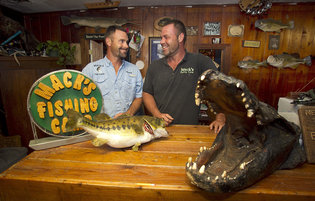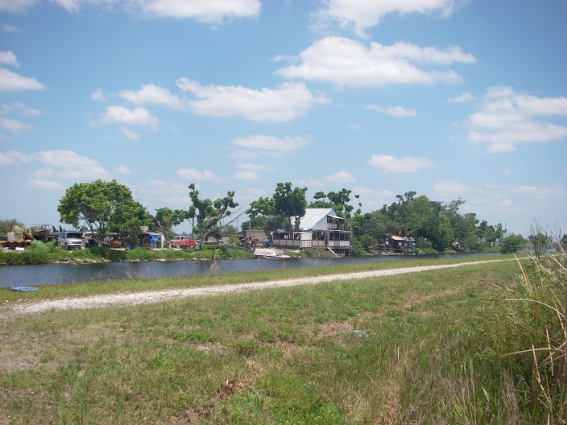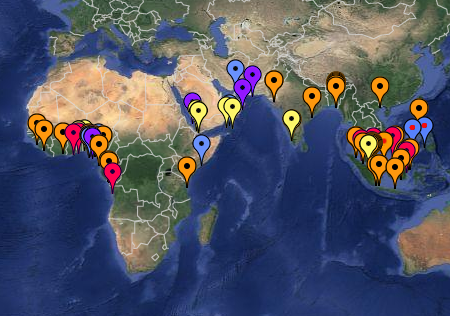living in the land of a lost way of life
Posted on Wednesday, 30 March 2011
By Susan Cocking
With school over for the day on a warm, late-March afternoon, a gaggle of kids swarmed the dock at Mack’s Fish Camp on the edge of the Everglades. They cast small worms and lures into the Miami Canal and pointed and laughed at Sneaky Pete, an alligator that lives beneath the wooden planks.
After a couple of little boys lost interest in fishing, they launched into horseplay that escalated into complaints and sniffles.
Keith Jones, father of four and coproprietor of the fish camp with twin brother Marshall, was unfazed.
“Guys, if you’re gonna fight, there’s sand — and it’s soft,” a nonchalant Jones said, redirecting the combatants to a safer arena. But the fight was over before it really started as the youngsters moved on to splash each other in an above-ground pool.
It was a typical scene from a fading way of life along urban South Florida’s western frontier. This small settlement at the end of a two-mile-long dirt road off Krome Ave. on the Miami-Dade/Broward border is a place where youngsters settle grievances with a quick skirmish and a handshake, ply rope swings instead of X-Boxes; and where families and friends socialize beside a bonfire instead of a restaurant.
‘OUR SURVIVAL’
“This land has given us our home and our sustenance and our survival,” Jones said.
The 32-year-old outdoorsman and his twin — also a father of four — grew up here hunting gators on airboats, fishing for bass and bream in the canal, and wrangling snakes, raccoons, wild hogs, and other assorted wildlife. Although they attended school in Pembroke Pines, Keith and Marshall both say they couldn’t wait to get home, take off their shoes and roam barefoot on the levees of what is now Everglades Water Conservation Area 3-B.
The twins learned how to live off the land from the grandparents, Mack and Nell Jones, who raised them and ran the fish camp from the early 1960s until their deaths. Keith and Marshall took over the business in 1999 — the fourth generation of Gladesmen to live on this sliver of limestone between two levees settled by their great-grandfather, Mack Jones Sr., in 1937. Keith’s wife, Betty Jean, and Marshall’s spouse, Nicole, both consider themselves Gladeswomen.
Life outside South Florida’s urban boundary can be quiet, exciting, laborious and dangerous. The twins and their families have experienced drought, flood, wildfires, fish kills and the vagaries of the economy and politics. Although the fish camp once did a thriving business from residents and visitors who loved to go mudding (riding around the levees in three-wheeled, off-road vehicles), that income evaporated several years ago when state law restricted the practice on some public lands.
A FAMILY AFFAIR
Today, the brothers are promoting their outpost as a wholesome venue for family recreation, offering private airboat tours, boat rentals, guided bass fishing, a general store and one-room rental cabins that come with a canoe.
“When we grew up here, the people were rowdy hunters — rednecks,” Keith Jones said. “That was great for us boys. But I didn’t want any type of riffraff around, especially with our girls. We’re not going to have any drunkards.”
Added Marshall: “We’re a mom-and-pop, family-friendly business.”
The Jones brothers supplement their income by assisting Miami-Dade Police Department, the Broward Sheriff’s Office and the Florida Fish and Wildlife Conservation Commission with airboat rescues. About twice a month, some airboater will crash, get lost or break down somewhere in the Everglades, and the twins are called out to find them.
They also provide logistical support and expertise for engineers and researchers working on the multibillion-dollar effort to restore natural water flows through the Everglades.
And for years, the camp’s picturesque, one-story stucco building and collection of trailers has served as the backdrop for movies such as African Queen, Cape Fear, Drop Zone and Fair Game. Also, an episode of the TV show Bones was recently filmed at Mack’s.
But the focus of daily life for the Jones twins is family and land. Neither has lived anywhere but here, and both hope to pass on their Gladesmen way of life to their children.
“Between each of us having four children, I’m very confident we’ll have at least one child apiece who will pick up the torch and carry the heritage,” Marshall said.
“We’ve had a pretty simple existence. An unusual way of life, yes. But it used to be the norm.”




